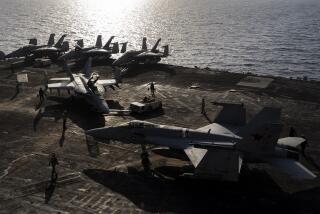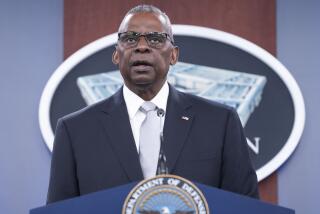Gulf Role Open-Ended, Navy Chief Says
- Share via
WASHINGTON — The Navy does not want to “continue to operate at this level” in the Persian Gulf but will remain as long as Iran threatens commercial shipping in the vital waterway, Navy Secretary James H. Webb Jr. said Wednesday.
Webb, who just returned from a three-day trip to the gulf, said that the United States will be able to “downsize” its fleet in the region when Iran ceases its attacks on neutral ships and when U.S. allies begin to “live up to their responsibilities” for policing the volatile area.
Webb repeatedly declined to estimate how long U.S. forces will remain in the gulf, saying that the length of the American commitment is a political decision that must be made by President Reagan. Employing Navy slang, Webb commented: “That’s a little bit above my pay grade.”
The U.S. Navy has 31 warships in or near the gulf, with about a dozen more on the way. Their chief mission is to escort 11 Kuwaiti oil tankers, re-registered as American vessels, in and out of the gulf, which has been a battleground in the seven-year-old Iran-Iraq War.
In a Pentagon briefing, Webb said that he had expressed “concerns” about the gulf mission in a private memo to Defense Secretary Caspar W. Weinberger in July, just before the naval buildup in the gulf began. The memo reportedly drew a sharp rebuke from Weinberger, who told Webb that it was his duty to support Administration policy.
“The concern that I and many people had was that we would be pulled into an obligation that did not have specific goals attached to it so that we couldn’t measure when the goals had been met and we could then downsize our forces,” Webb said Wednesday.
Webb later elaborated: “ . . . Without being able to clearly articulate what our goals, what our objectives, are politically, it’s difficult to measure the military commitment. . . . It creates a vulnerability in military forces that are committed. . . . Quite often the political debate paralyzes those forces, and that’s when we end up having problems.”
Webb indicated that he was satisfied that the goals of the gulf operation have been clarified but acknowledged that conditions for ending the U.S. military involvement in the region are largely out of American hands.
He also said that he had expressed reservations about the United States embarking on the gulf mission without the military support of European allies, who are more dependent on Persian Gulf oil than is the United States.
He expressed gratitude that Britain, France, Belgium, Holland and Italy have sent minesweepers and other ships to the region in recent weeks. But Webb made it clear that their military presence--and that of other nations who use the waterway but who have not yet sent forces--is not sufficient to allow the United States to reduce its gulf fleet.
Webb said that he visited seven warships in the region and talked directly or by loudspeaker to about 10,000 sailors and Marines. He said that morale is “extremely high.”
Webb said that sailors on the battleship Missouri asked him, “If we are taken under fire, do we have to confer with higher authority before we can defend ourselves?” Webb said he responded, “You just have, and you may.”
More to Read
Sign up for Essential California
The most important California stories and recommendations in your inbox every morning.
You may occasionally receive promotional content from the Los Angeles Times.










